The Best Property Management Software
Property management software can help manage leases, track renewals, and automate rent collection. We’ve analyzed options for businesses of various sizes and specialties, from large commercial owners to small residential firms.
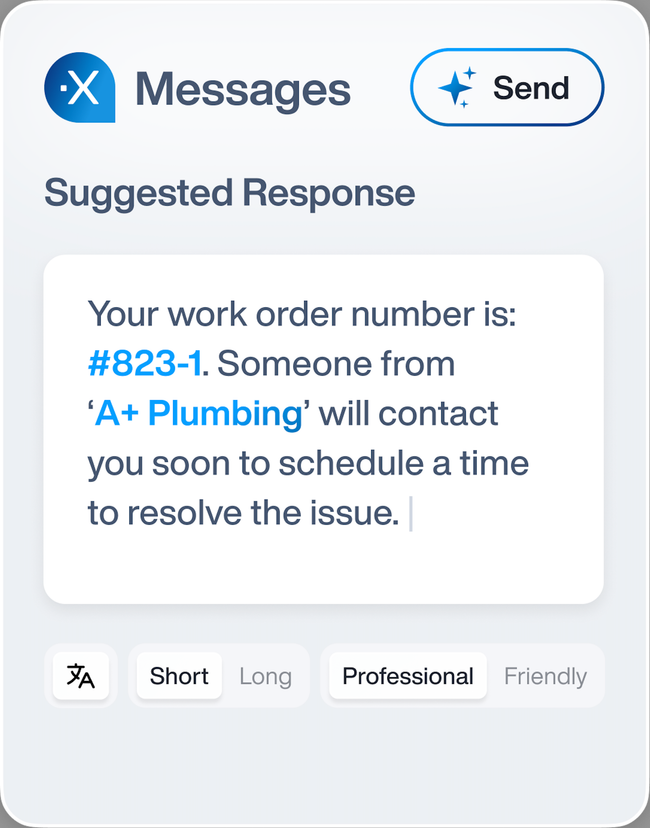
- Strong CAM features
- Customized commercial reporting
- Online payments
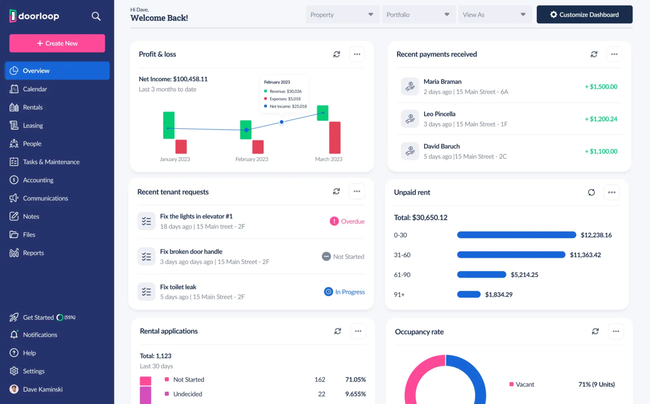
- Fully customizable chart of accounts
- Manages all property types
- Offers QuickBooks integration
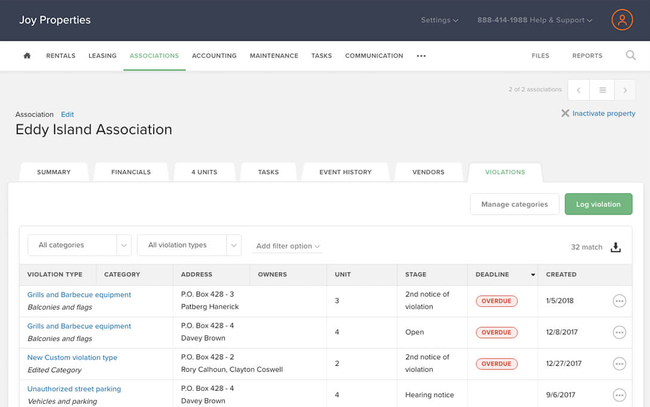
- Scalable (for 1 unit or 5,000 units)
- Core package includes all features
- Annual pricing discounts available
The best property management software includes tracking rent, scheduling maintenance and repairs, screening applicants, and paying vendors.
To help you find the best solution, we’ve conducted research based on our review methodology and put together a collection of our best picks for property management software.
- AppFolio: Best Overall
- DoorLoop: Best Accounting Tools
- Buildium: Best for Residential Properties
- Condo Control: Best for HOAs
- Yardi Breeze: Easiest to Use
- Avail: Best for Independent Landlords
- RealPage Commercial Property Management: Best for Commercial Properties
- Hemlane: Best for New Buyers
- TenantCloud: Most Affordable Option
- MRI Commercial Suite: Best for Diverse Portfolios
AppFolio - Best Overall
AppFolio is a great fit for both residential and commercial property management. The tool has one of the most modern-looking interfaces we’ve seen, letting you navigate between different functions easily. Its mobile app stands out, allowing residents to submit maintenance requests, pay rent, and view contracts from their phone. It’s a win-win for you and your residents, helping increase satisfaction and decrease late payments.
The system also has a streamlined maintenance tool that works well for all portfolio types. Residential PMs can create custom inspection forms for each apartment type, allowing for specific move-in and move-out checks. For commercial buildings, businesses can submit work order requests for common area maintenance (CAM), helping you better maintain shared spaces within an office building. It even has an AI-powered smart maintenance add-on to help you automate responses and prioritize critical jobs.
Appfolio offers different packages for residential, commercial, and community association portfolios, each with specific features. Unfortunately, prices are not publicly listed, so you’ll need to request a quote for exact figures. That said, the lowest Core plan has a minimum spend limit and a 50-unit minimum.
DoorLoop - Best Accounting Tools
DoorLoop’s accounting module lets you manage your books and properties from one place. It features a customizable chart of accounts built specifically for property management. You can create your own with sub-account structuring, or use the built-in templates created with best practices. You can even assign them to lease charges, credits, or deposits for accurate categorization.
The accounting module also lets you connect your bank, credit, and debit cards for automatic reconciliation. The system inputs every transaction for your business, so you can compare it with your bank statement. Check off the matches, and DoorLoop calculates the cleared balance and highlights the differences. From there, you can access a detailed reconciliation report to ensure your books are accurate.
Overall, the software is pretty affordable, with the Starter plan beginning at $69/month. Prices on every plan increase by $20/month for each additional 20 units. That said, the live bank connect and QuickBooks Online sync are only available on the Pro plan starting at $159/month. We wouldn’t recommend DoorLoop for independent landlords or small companies managing fewer than 20 units, as more cost-effective alternatives like Avail are available.
Buildium - Best for Residential Properties
Buildium’s resident center tool streamlines rent collections for both you and your tenants. It provides an easy-to-access online portal to pay fees and monthly rent, enabling more consistent collections than mailing checks or cash. Residents can set up recurring payments and notifications so they never miss a deadline. Plus, it’s accessible on a desktop or the mobile app, so they can pay from anywhere. That said, Buildium does collect a 2.99% fee per credit card transaction.
The resident center also allows tenants to submit maintenance requests from their phones. They can simply describe the problem, whether it’s a leaky faucet or an HVAC issue, and take a picture to submit the request. From there, you can quickly assign a staff member or a maintenance vendor to fix the problem. This helps you keep a high resident satisfaction rate while recording incoming and historical requests.
Buildium starts at $58/month for full accounting, maintenance, and resident portal features. However, Buildium doesn’t offer live phone support with its Essential plan and has additional fees for inspections and bank account setup, which can increase the price.
Condo Control - Best for HOAs
Condo Control is solid, specifically for HOAs and condominiums, covering communication, record-keeping, and resident engagement. It offers features like automated package tracking, visitor parking management, and security patrol assistance, enhancing the efficiency of security and concierge teams.
Also, residents can report maintenance issues and submit requests directly through the Condo Control platform, with the ability to communicate with maintenance staff. The system also facilitates online payment processing, including ACH, electronic funds transfer, and credit/debit cards.
However, Condo Control lacks a built-in tenant screening feature, which might not be a significant drawback for HOAs and condominiums primarily focused on maintenance and community management rather than tenant placement.
Want more options? Check out our list of best homeowner association software.
Yardi Breeze - Easiest to Use
Yardi Breeze is one of the easiest platforms to operate, with a user-centric design and intuitive navigation. Even users with minimal technical skills can negotiate the platform effectively, streamlining tasks for landlords and real estate professionals.
Yardi Breeze simplifies several property management processes, from leasing and rent collection to maintenance requests and financial reporting. The platform is highly versatile, supporting residential and commercial properties. And, its cloud-based deployment allows remote access from any device, enhancing flexibility and on-the-go management.
Finally, Yardi Breeze promotes ease of use through automated rent collection, which minimizes the hassle of manual payment processing. It also has a maintenance request portal that allows tenants to report issues directly through the system. However, the minimum monthly cost is $100, and you’ll need to subscribe to the Premier plan to access CRM tools and investment management.
Avail - Best for Independent Landlords
Avail’s feature set is well-suited for independent landlords managing a small number of properties. It offers features like syndicated rental listings, which allow you to post them with a single click to popular sites such as Realtor.com and Apartments.com.
Avail’s free plan includes state-specific, lawyer-reviewed lease templates that can be customized and signed digitally. The tenant screening tool provides checks for credit, background, and evictions and offers online payment options for residents. The Plus plan adds FastPay, enabling next-day rent payment deposits.
However, Avail lacks a dedicated mobile app. While its website is mobile-friendly and accessible via web browsers, the absence of an app might be a drawback for some landlords.
RealPage Commercial Property Management - Best for Commercial Properties
RealPage is best for managing commercial properties such as office buildings, retail spaces, and industrial facilities. The platform handles tasks like common area management and maintenance issues unique to these buildings.
RealPage provides essential functionalities like CAM recoveries, tenant portals for payments and service requests, and lease accounting and administration. We also like that it features lease boilerplates, amendment tracking, and customizable fields, simplifying the leasing process and minimizing legal risks for commercial property owners.
Additionally, RealPage offers detailed financial management, including accurate billing calculations for CPI increases. However, it does not publicly disclose its pricing and requires a consultation call to get a quote.
Want more options? Check out our list of best commercial property management software.
Hemlane - Best for New Buyers
Hemlane caters to new property buyers and smaller real estate firms, property managers, and owners. During our demo, we found Hemlane adept at simplifying the leasing process. It accomplishes this through marketing and tenant placement features and maintenance tools to handle repair requests.
Hemlane is ideal for both single-unit landlords and small property management firms controlling up to 100 units. Its Basic package starts at $28/month plus $2/unit, making it a cost-effective option.
However, if you require advanced accounting features or extensive integration with third-party apps, Hemlane may not meet all your needs. It’s limited to managing properties solely within the United States. It also lacks a dedicated mobile app, though you can still access the platform through your device’s web browser.
TenantCloud - Most Affordable Option
TenantCloud is highly cost-effective, starting at $17/month for unlimited properties and units. It’s an ideal choice for small to medium-sized property management companies that are scaling quickly.
TenantCloud offers a full set of tenant screening tools, including checks for income verification and criminal, eviction, and credit history. Once tenants are selected, the platform enables them to e-sign leases. Additionally, it supports online rent collection through various payment methods, such as debit cards, credit cards, and ACH transfers.
The platform also allows tenants to submit and track maintenance requests online. We like that TenantCloud serves a range of business sizes, with scalable subscription plans suitable for DIY landlords and large property businesses. However, more advanced features are available in higher-tier plans. For example, the Starter plan is limited to 15 leases, one bank account, and 50 pieces of equipment.
MRI Commercial Suite - Best for Diverse Portfolios
MRI Commercial Suite is a good option for diverse ownership structures. That’s because it can accommodate various asset types, sectors, currencies, and geographies. We also like that it handles complex calculations through lease clauses, breakpoints, offsets, estimated payments, and recoveries.
MRI Commercial Suite includes an online tenant portal, MRI Tenant Connect. It enhances tenant engagement and service delivery by allowing them to access their account information, make payments, and submit service requests online. The AI lease abstraction tool is also a plus, automating data extraction and analysis for large and complex portfolios.
On the downside, user reports suggest that the software has a steep learning curve and a somewhat outdated user interface. For pricing, prospective users must contact MRI directly to obtain a quote.
What is Property Management Software?
Property management software streamlines residential and commercial properties’ operational and financial operations. It facilitates a range of tasks, including rent collection, maintenance scheduling, and property inspections. This type of software often features trust accounting, maintenance coordination, tenant communication through online portals, and reporting tools.
These platforms are designed to automate daily operations, improve tenant services, and maintain the overall health of real estate assets. They cater to a wide spectrum of users, from individual landlords with a handful of units to large companies managing extensive portfolios of thousands of properties.
Property management software addresses several business challenges, including efficient back-end accounting, payment processing, investment management, and tenant tracking. It also supports the management of work orders and complex reporting, enhancing the ability to oversee extensive property details and transactions.
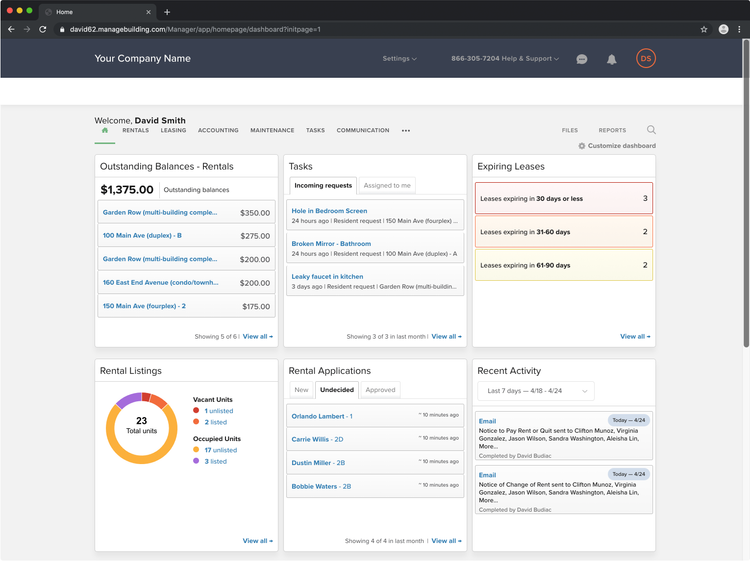
Key Features
Key features of property management software include rent collection, work order management, accounting, and tenant management.
- Accounting: Handles check writing, management of receivables and collections, bank reconciliations, top-level financial reporting, and fixed asset depreciation.
- Rent collection: Allows access to credit card payment portals and the ability to establish ACH payments. Keep track of which payments cover fees and/or security deposits.
- Tenant management: Track tenant information and optimize relationships. Store contact info, payment and service history, renewals, and rent increase schedules. Tenant screening functionalities can also analyze credit data and criminal histories.
- Work order management: Manage service work, preventative maintenance, and unit prep work. Coordinate work performed with internal staff and work subcontracted to outside vendors. Scheduling features optimize labor and equipment availability to ensure work is performed as efficiently as possible.
- Property tracking: Track property assets and value, vacancies, tenant histories, property descriptions, previous improvements, work, ownership, and investment information.
- Investment management: Track and report on ownership and investment data. Track investments, handle disbursements, and even identify new investors. Online owner portals provide owners with a snapshot view of their investment data.
- Prospect tracking: Find new tenants by databasing contact info, posting vacancy ads, scheduling showings, and coordinating with interested potential tenants. Can be thought of as an industry-specific CRM software module.
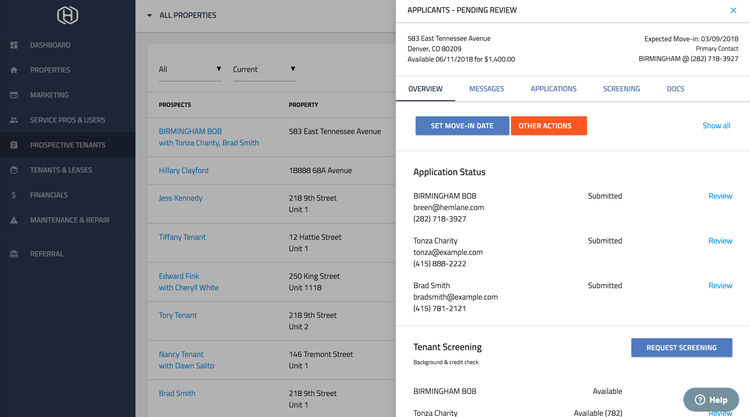
Primary Benefits
Property management solutions are becoming increasingly more accessible. Many features, which were reserved for only the most sophisticated enterprise solutions just a few years ago, are now available to property management businesses of all sizes and software budgets.
Software providers are leveraging many of the following tools to help property managers run their business more efficiently:
- Business Intelligence Dashboards: Provide real-time insights into various performance metrics such as property occupancy rates, financial operations, and maintenance activities. Utilizes data visualization tools to simplify analysis.
- Web Portals: Enhance communication and service delivery by enabling tenants to make payments, submit maintenance requests, and access important documents.
- Automation Features: Automates repetitive tasks such as scheduling rent collections, managing leases, and conducting tenant screenings.
- Improved System Integration: Integrates with other business systems like accounting or CRM software to avoid data duplication and enhance overall accuracy.
- Customizable Alerts: Keep property managers informed about lease expirations, overdue payments, and maintenance needs.
- Mobile Access: Allows property managers to interact with the software through mobile devices, beneficial for those who manage multiple properties or are frequently out of the office.
What Does Your Business Need?
Different property management companies have varied needs depending on the types and sizes of properties they manage. The best property management software for you depends on whether you’re overseeing large commercial spaces or small residential properties.
New Buyers and Small Businesses
These businesses, or even a single individual, may manage one or more single-family homes and/or a small apartment complex. Getting started with an accounting system that can handle collecting rent payments and tracking the basic expenses involved with being a landlord (such as general maintenance) will allow you to see how much profit you’re making in your investments.
Managers of Multiple Buildings
Companies that manage multiple buildings and a larger number of units will desire functionalities to help save money and make their lives easier. Advanced property management options include portals for tenants to log in and pay rent, submit maintenance requests, sign leases, and more. The system may also include a service portion, which will include a scheduling tool to ensure the proper maintenance workers are taking care of pressing issues at various locations as they occur.
Large Companies
If the business is part of a larger corporate real estate entity and manages thousands of units, you’ll likely look for an enterprise-level property management option or a complete ERP software option. The solution must be synced in with some real estate development features, as businesses of this size tend to have a development division and look to expand into new areas and properties. A strong focus should be put on reporting functionalities that can help the business make better decisions and lower costs.
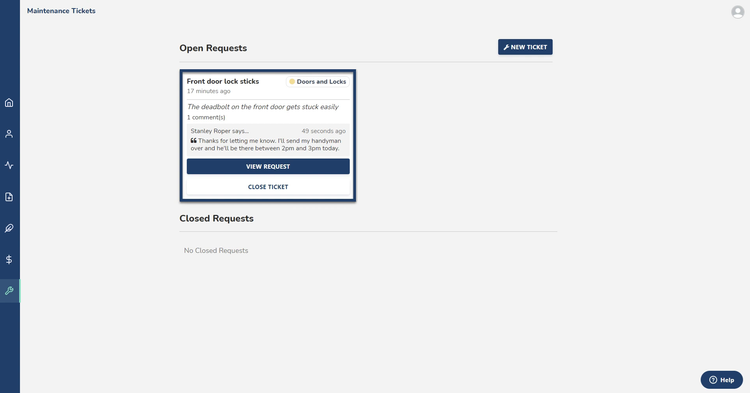
QuickBooks as Property Management Software
Using QuickBooks as a property management tool is possible for those handling small to midsize properties. QuickBooks Desktop enables you to set up company and customer files as various properties. This will allow you to handle tasks such as collecting rent from tenants and paying property owners and management companies, in addition to any maintenance fees.
If the property management business comprises several large properties or multiple complexes, you should consider a more advanced system.
Additionally, a professional property manager might be better off finding a trust accounting system. Once rent is received from the tenants, it needs to be disbursed to the property owners. This money should be kept in its own account and separate from any account used to pay expenses. Any money also received from the owners for the work you’ve done (your management fee) should be put into your own account.
QuickBooks lacks this type of account management, so it can be difficult to manage multiple properties using it.
Common Challenges
- Dealing with Vacancies: Minimizing vacancies is crucial to maximizing ROI. Property management software can alert you when leases are nearing expiration and assist in renewals or marketing units. Some software integrates with major listing sites like Craigslist or Apartments.com, allowing you to manage and update rental listings easily.
- Timely Maintenance Responses: Slow responses to maintenance requests can frustrate tenants. Effective property management software enables tenants to submit maintenance requests online and track the response. This improves communication and ensures requests are promptly assigned to the appropriate technician.
- Managing Finances Correctly handling security deposits is important. Property management software can help manage these funds in separate accounts and ensure compliance with tax regulations and asset depreciation. This helps streamline financial management and maintain transparency with tenants.
Technology Trends
There are many interesting trends in property management, particularly involving new technology and online solutions. Here are just some of the latest changes in the industry:
Know your demographic
Customer service has become a lost art in property management, yet keeping your tenants happy is the best way to ensure they re-sign a lease and keep the money flowing in your direction. Contacting a landlord through an app is much more convenient than waiting to place a phone call during traditional business hours.
Additionally, renter demographics are skewing younger and younger. Tenants in the Millenial and Gen Z age brackets will often want high-tech solutions to rental services, environmentally-conscious living spaces, and more access to social services like community nights or fitness centers. Ignoring this demand puts your company at risk of appearing outdated and thus unattractive to a renter.
Basic expectations from young renters include:
- Wi-Fi compatibility
- Ability to apply online
- Flexible lease arrangements
- Online payment options
- Enhanced security
- Outdoor amenities
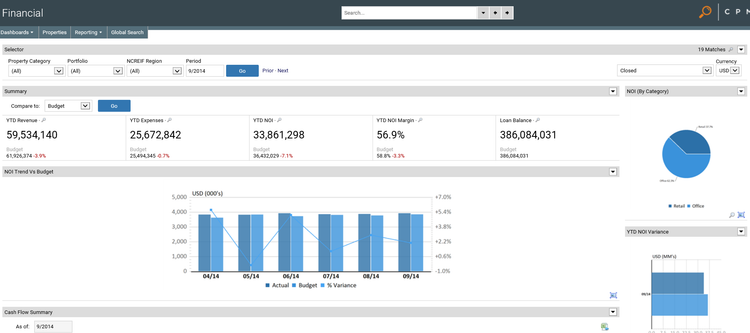
Embrace modern technology
Almost everyone is connected to the web. In today’s day and age, it’s hard to imagine a property management company operating without a website. And now, software solutions offer property management mobile apps for tenants and prospects. These mobile apps allow the tenant to have all the same functionality they are used to on a company website, such as paying rent, reviewing lease terms, and submitting work orders. As mentioned before, this makes customer service much easier to facilitate.
Prospects should be able to view apartment availability and submit applications. An app lets you modify listings on the fly, even marking a property as no longer available after a successful showing. This keeps you and potential tenants from wasting time scheduling viewings at already promised properties.
Use augmented and virtual reality
Many industries are jumping on the virtual reality wagon, so much so that it’s projected to become a $22 billion dollar industry. And real estate has taken advantage of this trend to great effect. Companies like Matterport allow for 360-degree visualizations of dream homes to be built.
Special cameras pick up every room aspect and allow prospective tenants to go on a 3D virtual tour of a listing. Like Google Maps’ street view, you can drag and drop your mouse to get the exact view of a room instead of relying on the photos posted on the property management website.
Property managers don’t need to gain access to any special technology to have these features available in their listings. Companies like Facebook now allow 3D and 360 photos to be taken with any mobile device and uploaded to your website or app. These images allow potential tenants to “move” around the photo.
Pricing Guide
Property management software vendors usually deploy a per-unit pricing model with tiered packages that add features with higher subscription fees. Also, pricing usually differs based on the types of properties you manage in your portfolio, whether they’re residential, commercial, affordable housing, etc. Here’s a breakdown of what you can expect to pay based on the number of units you manage and some systems that will best fit:
Low-Tier
- Company Size: 1-25 units or small property managers
- Expected Cost: $50-$500/month ($600-$6,000/year)
- Examples: Buildium, DoorLoop, Arrivo, TenantCloud
Mid-Tier
- Company Size: 25-500 units or mid-sized property managers
- Expected Cost: $500-$3,000/month ($6,000-$36,000/year)
- Examples: Appfolio, Yardi Breeze, Rent Manager, ResMan
High-Tier
- Company Size: 500-5,000 units or larger property managers
- Expected Cost: $3,000-$8,000/month ($36,000-$96,000/year)
- Examples: MRI Software, Yardi Voyager, RealPage Commercial
Enterprise
- Company Size: 5,000+ units or enterprise-level property management firms
- Expected Cost: $10,000+ per month ($120,000+ per year)
- Examples: Yardi Enterprise, SAP RE-FX, Oracle Property Manager








































































